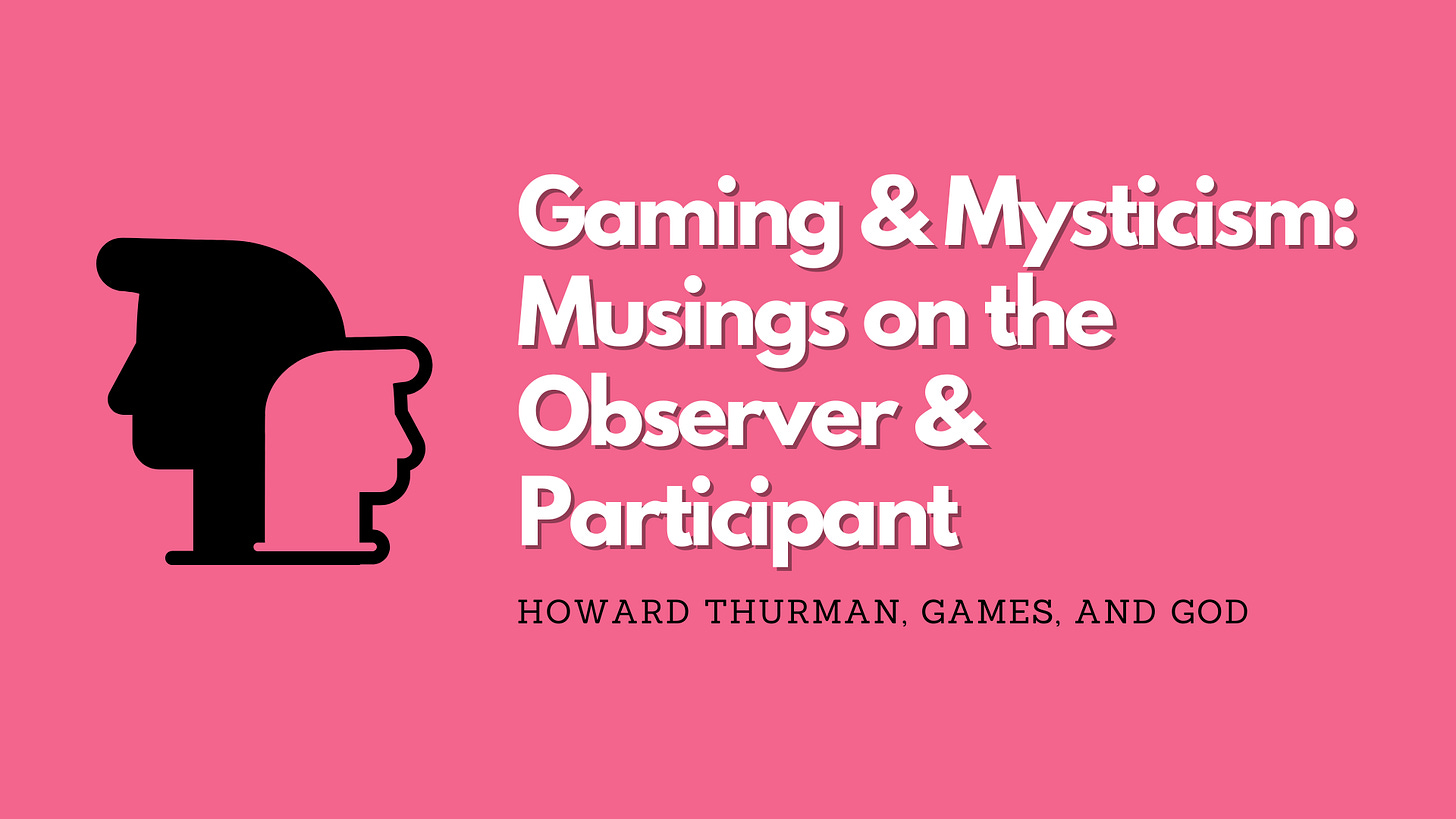Gaming & Mysticism: Musings on the Observer & Participant
Howard Thurman, Games, and God
Part of a series of reflections with the Phygital Fellows ahead of our Boston pilgrimage
In just a few weeks, I’ll be walking the streets of Boston with a cohort of fellow digital ministers—The Phygital Fellows.
In preparation for this pilgrimage, I’m reading a selection of Howard Thurman’s essays (specifically the Essential Writings collection) and meditating on his theological witness. The goal is to think deeply not just about digital (and by proxy, nerd) ministry, but about our presence in it—how we show up, what we carry, and how God meets us both online and off.
Reading Thurman through a nerd-ministry lens is maybe not how these essays were intended to be engaged—but that’s the joy of one’s calling.
We’re not just theologians; we’re streamers, Discord admins, content creators, game designers, and digital chaplains.
And for many of us, gaming is not just a hobby—it’s a liturgical act. It's a space where meaning is made, where identities are shaped, and where spiritual truth sneaks in through pixels and controller vibrations.
The Game Never Stops
One line from Thurman struck me deeply:
The individual has never completely been one with his experiences. He remains always observer and participant.
That line lives rent-free in my soul now.
It names something I’ve felt for a long time about both ministry and the spiritual life. Namely, that we are never only living—we are also watching ourselves live. We are doing and narrating, feeling and analyzing, responding and reflecting. There’s always a part of us just off to the side, taking notes on the whole thing.
Thurman links this dynamic to divine encounter.
In the presence of God, we’re offered a holy pause—a moment where our past doesn't disappear, but quiets. We see our patterns. We hold our wounds differently. And we get a glimpse of who we are rather than just what we’ve done.
The observer and participant work together. Transformation happens not by scrubbing our history away, but by stepping far enough outside it to reframe it.
And here’s where I find games—especially narrative-heavy or decision-based games—to be a profound spiritual tool.
Why Games Transcend
I’ve always appreciated John Green’s line about books:
Whenever we read books, we’re the closest to living the life of another character.
But I think games go further than that.
Books let us feel for someone else.
Games make us feel like someone else—but crucially, they also reveal who we are in the process.
Games don’t ask us to become Holden Caulfield from Salinger’s The Catcher in the Rye. They ask: What would you do if you were in Holden’s position?
Would you rebel?
Would you confess?
Would you run?
Would you stay?
That’s the radical thing about gaming—it lets us participate in a story while also observing the decisions we make inside it. We become both actor and audience to our own instincts. That tension—between immersion and detachment—isn't just a mechanic. It’s a mirror. And often, it’s a moment of grace.
Inside Out and Outside In
I think this is what Thurman saw in divine experience. And that’s what I think games offer us, too: a pause, a question, a glimpse of ourselves outside ourselves.
As digital ministers—especially in nerd spaces—we see this all the time.
A Twitch stream isn’t just content. It’s communal witness. A Discord prayer request channel isn’t just a message board. It’s sacred ground. And every time someone plays a game and realizes, “Oh, I didn’t expect myself to make that choice,” they’ve entered a kind of divine encounter.
God meets us not just in confession booths and sanctuaries, but in save files and cutscenes.
I think Thurman would understand that. At the very least, I think he’d respect the intentionality of looking.
And so that’s my prayer for this pilgrimage: that we might look, really look—not just at Boston, or Thurman, or even at the communities we serve—but at ourselves. That we might notice where we are both observer and participant in our own story. And that we might, through games and essays and scripture and sacred wandering, encounter something holy.
Grace can live in a paragraph.
Or a player choice.
Or a line of code.
And that is an incredible opportunity.
World 3-24 Complete
Q: Why did Howard Thurman get really good at open-world games?
A: Because he always knew how to see the whole map from within the moment.



